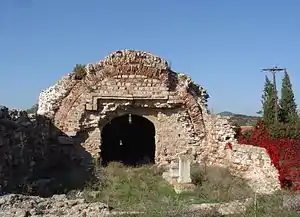
The Evrenos Bey Han, also known as the Hana of Trajanopolis (Greek: Χάνα της Τραϊανούπολης; Turkish: Kara Ilıca’daki Hanı[2]) or just Hana is a caravanserai (han) in northern Greece, and one of the oldest Ottoman monuments in the Balkans. It was built in 1370–90 by Gazi Ahmet Evrenos and is located in the Trajanopolis Baths,[3][4][5] just twelve kilometers to the northeast of Alexandroupolis. The monument is a long, rectangular building with external dimensions of 38.8 by 13 metres (127 ft × 43 ft).[3]
Description
Trajanopolis was an important Roman city founded by the emperor Trajan (r. 98–117 AD) on the ancient Via Egnatia.[6] Thermal springs could be found in the city, and thus a spa town was created. During Byzantine rule in the seventh and fourteenth centuries, Trajanopolis is mentioned to have been the metropolis of the ecclesiastical province of Rhodope.[5]
The han functioned as an inn (due to the road station) near the Ottoman hamam (baths) complex, of which today ruins remain dating to the sixteenth century. Today, modern facilities for spa therapy have been rebuilt in the archaeological site.[7] The han is characterized by its grandeur, as it was a public utility project by the Ottomans. This work also shows the expansive nature of the empire. As a monument, it differs from the corresponding Byzantine ones in terms of architecture, size and construction method. At the base of the han is the base and slab of an early Christian pulpit.[5]
On the neighboring hill where the small church of Agios Konstantinos and Georgios stands today used to be a center of gathering of dervishes, the Isklar tekke, which was mentioned by the Ottoman traveller Evliya Çelebi back in 1668.[5]
See also
References
- ↑ Έρση Μπρουσκάρη (2008). Η Οθωμανική Αρχιτεκτονική στην Ελλάδα. Αθήνα: Υπουργείο Πολιτισμού, Διεύθυνση Βυζαντινών και Μεταβυζαντινών Αρχαιοτήτων. p. 333. ISBN 978-960-214-792-4.
- ↑ Prof. Dr. Heath W. Lowry (2012-03-12). "Osmanlıların Balkanlara Yerleşmesinde İmaretlerin Rolü / The Ottoman Settlement in the Balkans: The Role of Imarets". Διάλεξη Οθωμανολόγου Heath W. Lowry από το Πανεπιστήμιο Princeton στο Fatih Üniversitesi. Retrieved 2012-07-16.
- 1 2 "Η "Χάνα"". Ιστοσελίδα Δήμου Τραϊανούπολης. Archived from the original on 2013-07-16. Retrieved 2012-07-13.
- ↑ Kate Fleet (2009). History of Turkey Vol 1, Byzantium to Turkey 1071-1453. Cambridge University Press. pp. 161. ISBN 978-0-521-62093-2.
- 1 2 3 4 Μ. Κορτζή - Β. Σιαμέτης. "Τραϊανούπολις (βυζαντινή εποχή)". Θρακικός Ηλεκτρονικός Θυσαυρός. Retrieved 2012-07-25.
- ↑ "Αρχαιολογικός χώρος Χάνα - Τραϊανούπολη". visitevros.gr - Ιστοσελδία Περιφέρειας Ανατολικής Μακεδονίας και Θράκης. Archived from the original on 2011-07-21. Retrieved 2012-07-13.
- ↑ "Τραϊανούπολη". Σύνδεσμος Δήμων και Κοινοτήων Ιαματικών Πηγών Ελλάδας. Archived from the original on 2012-06-07. Retrieved 2012-07-26.
External links
 Media related to Evrenos Bey Han at Wikimedia Commons
Media related to Evrenos Bey Han at Wikimedia Commons